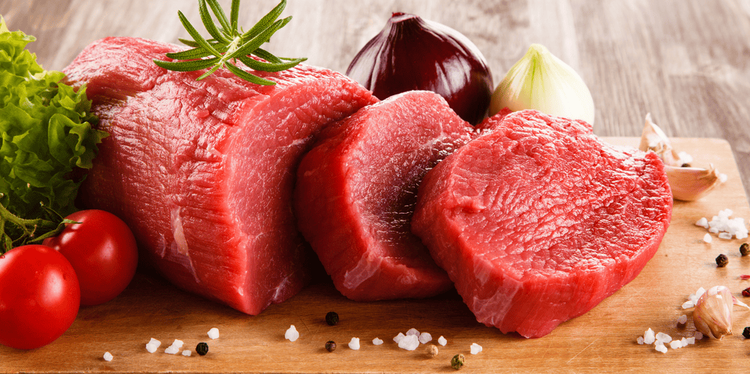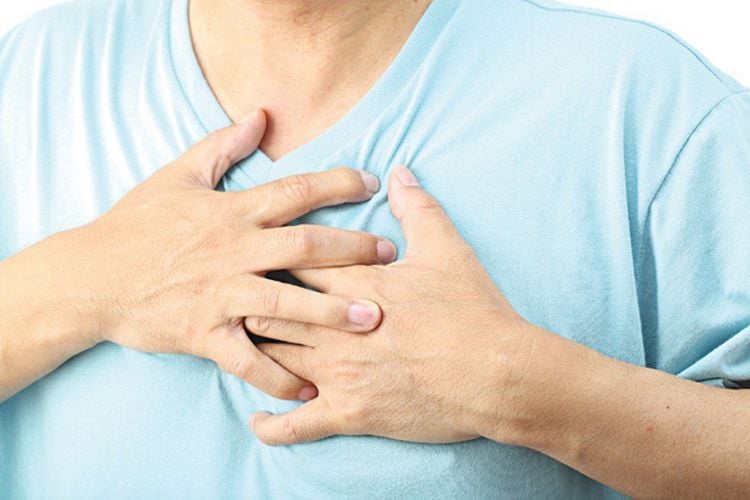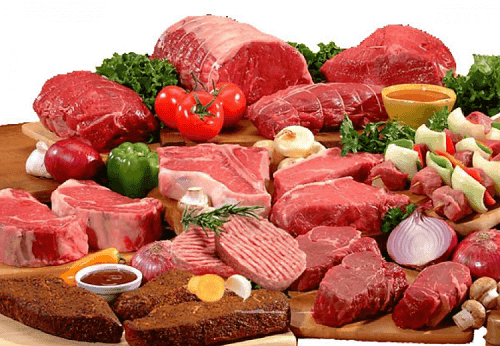This is an automatically translated article.
Red meat includes all forms of beef, pork, lamb, veal, goat and species of deer, bison and elk. Red meat is rich in protein, zinc, iron and vitamin B12, all of which are important nutrients for maintaining our health. So is eating a lot of red meat good? And why should you limit eating red meat?
1. Find out the popular types of meat in today's meals
Humans from time immemorial have eaten meat throughout evolution. However, the meat consumed today is different from the meat of the past. In the old days, animals roamed free and ate grass, insects, or other natural foods suited to them. Today, livestock and poultry are raised in farms or family farms mainly with processed foods, or even growth hormones.
Some of today's meats are processed after the animals are slaughtered by smoking, nitrate treatment, chemical preservatives or other chemicals. With many different processing methods, meat is divided into:
Processed meat: These products are usually from cows or pigs that are raised normally in households, then go through many processing methods. difference. Examples include sausages and bacon. Regular red meat: Unprocessed red meat is also known as red meat. Includes lamb, beef, pork and some other mammalian meats. White Meat: Meats that are white when cooked are defined as white meat including poultry such as chicken and turkey. Organic, grass-fed meat: This meat comes from animals that are naturally fed and raised organically, free of drugs and hormones. Breeders also do not add any artificial chemicals. When considering the health effects of meat, you need to consider the source of the red meat. Many red meat studies, especially those done in the United States, have primarily examined meat from factory-raised animals that are fed grain-based diets.

Thịt bò được sử dụng phổ biến trong các bữa ăn hiện nay
2. Nutritional sources from red meat
Red meat is one of the most nutritious food sources you can eat. Red meat is packed with vitamins, minerals, antioxidants, and many other nutrients that can have profound effects on health.
100 grams of raw ground beef contains
Vitamin B3 (niacin): 25% of the RDA Vitamin B12 (cobalamin): 37% of the RDA (this vitamin cannot be obtained from plant foods) Vitamin B6 (pyridoxine): 18% of the RDA Iron : 12% of the RDA (this is high quality heme iron, much better absorbed than plant iron) Zinc: 32% of the RDA Selenium: 24% of the RDA Several other vitamins and minerals in smaller amounts Also It also provides 176 calories, with 20 grams of quality animal protein and 10 grams of fat. As a result, people on a meat-free diet are often low in these nutrients, which can affect muscle and brain function. In fact, grass-fed beef is more nutritious than grain-fed beef, as it contains more heart-healthy omega-3s, CLA fatty acids, and higher amounts of vitamins A and E.
3. Is it good to use red meat?
3.1. Red Meat and Mortality In a 28-year study, published April 9, 2012 in the Archives of Internal Medicine, a team of Harvard researchers looked for a statistical association between the meat and cause of death. The subject groups under scrutiny included approximately 84,000 women from the Nurses' Health Study and 38,000 men from the Health Professionals Follow-up Study.
People in the study who ate the most red meat tended to die younger and more often from cardiovascular disease and cancer. These people also tended to gain more weight, exercise less, smoke more, and drink more alcohol than other healthy people in the study. However, even when the researchers analyzed the effects of an unhealthy lifestyle, mortality and meat were still associated.

Ăn nhiều thịt đỏ nhất có xu hướng tử vong do bệnh lý tim mạch gây ra
The study also found that nearly 24,000 people in these two studies died from cardiovascular disease or cancer. Using questionnaires, the scientists asked study participants to estimate how many servings of meat they consumed. Unprocessed red meat includes beef, pork, lamb and hamburger with a serving size of about 100 grams (3 servings). Processed meats include bacon, sausages, bacon and other processed items. Two slices of bacon corresponds to 1 serving
Research results show that each additional daily serving of red meat increases the risk of death by 13%. The impact increases to 20% if the serving is processed, for food items such as hot dogs, bacon and deli meats.
3.2. Red meat with heart disease, diabetes The effects of red meat on health have been well studied. However, these studies are observational studies designed to show an association and cannot prove causation.
Several observational studies show that red meat is associated with a higher risk of cardiovascular disease, diabetes. But not all red meat has the same health benefits.
A large review of 20 studies including 1,218,380 individuals found that processed meat was associated with an increased risk of heart disease and diabetes. However, no association was found for unprocessed red meat.
When it comes to increasing your risk of heart disease, diabetes and death, it's important to distinguish between processed and unprocessed meat, as both can have very different effects. Observational studies seem to agree that processed meat (not unprocessed red meat) is associated with an increased risk of early death and many diseases.
3.3. Red Meat Increases Cancer Risk Observational studies show that red meat consumption is associated with an increased risk of colorectal cancer - the fourth most commonly diagnosed cancer in the world.
The problem with these studies is that they include both the effects of processed and unprocessed red meat. Meta-analysis of multiple studies shows that the increased risk of colorectal cancer is very low. Other studies show that it's not the meat itself, but the harmful compounds that form when meat is cooked, that contribute to the increased risk.
Therefore, cooking method can be a major determinant of the final health effects of meat. Processed meat products contain many additives and chemicals, which can contribute to health hazards.
4. Is it necessary to eat red meat?
Dr. Frank Hu, chair of the Department of Nutrition, Harvard University recommends that you stop considering red meat as the main food source and instead use only about 2-3 servings per week, especially when they are eaten. cook at high temperature. This is because high-temperature cooking of meat can produce harmful compounds including heterocyclic amines (HAs), polycyclic aromatic hydrocarbons (PAHs) and advanced glycation end products (AGEs). These are substances that can cause cancer in animals.
Thịt gia cầm có thể được lựa chọn thay thế thịt đỏ trong bữa ăn
Plus, although red meat is high in protein, which promotes muscle growth, and vitamin B12 to make red blood cells. For example, a 100-gram serving has about 45% of the Daily Value (DV) for protein and 35% of the DV for B12. A serving of red meat is also a good source of zinc, which can help the body produce testosterone and selenium, a powerful antioxidant. In addition, red meat is rich in iron. However, Dr. Hu says you don't have to eat red meat to get these essential nutrients. Because we can get these nutrients from poultry, fish, eggs and nuts, and plants.
Any food when used in excess can have the opposite effect. Red meat has a positive effect on the function of both the body and the brain, but it should not be overused. You can't know in the meat you're eating whether there are chemicals or preservatives left in the meat that are safe for health, or whether the way you cook them causes them to create compounds that are harmful to health. health of you and your family.
There are many options for you to change dishes and recipes for your family while still ensuring the necessary amount of nutrition. Using 2-3 servings (each serving in the palm of your hand) per week is ideal.
Diet greatly affects our health and longevity, so only a moderate amount of red meat should be added. When processing, it should not be at too high a temperature, to avoid burning or burning food, because this will have a great impact on health.
In case if you have not been able to maintain a scientific diet and your body appears abnormal, suspecting cancer, you should go to a reputable medical facility for examination and accurate diagnosis. . Currently, Vinmec International General Hospital has a cancer screening package with high accuracy, helping customers understand their current health status to make appropriate adjustments in diet and exercise.
Please dial HOTLINE for more information or register for an appointment HERE. Download MyVinmec app to make appointments faster and to manage your bookings easily.
Reference source: health.harvard.edu - healthline.com












